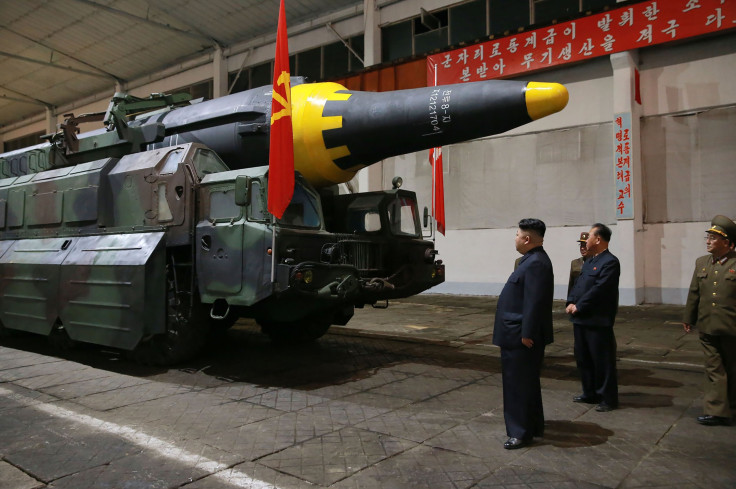Can North Korea Missile Hit Washington? Pyongyang Touts Nuclear Capabilities On Anniversary Of Strategic Force

North Korea, which has threatened its neighboring countries and the West with its growing nuclear capabilities, celebrated the anniversary of its strategic force in charge of missile development Monday. Amid growing concerns that Pyongyang may be developing a missile that could hit the U.S. mainland, the reclusive country touted its nuclear program saying that its missiles can hit any target in a speedy and accurate manner.
"The Strategic Force, which is beloved by people, is the nation's pride and power. It has provided the country a reliable nuclear force," the Rodong Sinmun, the main organ of the ruling Workers' Party of Korea said, according to Yonhap News. It also said that the missiles developed by the force can hit any target on Earth and that their launches are always successful.
Sinmun on Monday also said that the missiles developed by the force cannot be tracked due to its speedy launches and flights. North Korea is working on developing an intercontinental ballistic missile (ICBM), which will be capable of holding a nuclear warhead, and hitting Washington.
Read: South Korean President Denies Plans To Reduce Washington-Seoul Military Drills
While Pyongyang boasted of its capabilities of attacking any country in the world, it did not send out a direct threat message to the U.S. However, last year, it threatened that it will engulf the U.S. military bases in a sea of fire.
North Korea's celebration of the Day of Strategic Force to mark its creation in 1999 comes just days after South Korean President Moon Jae In and his U.S. counterpart President Donald Trump met to discuss ways of curbing the Kim Jong Un regime's continuous violation of the nuclear program.
Moon and Trump agreed to leave the door for dialogue with North Korea open "under the right circumstances," a joint statement said. It showed that Trump "supported President Moon's aspirations to restart inter-Korean dialogue on issues, including humanitarian affairs," and hailed South Korea's "leading role" in creating the conditions for the peaceful reunification of the two Koreas.
"President Trump and President Moon pledged to continue to coordinate closely to achieve our shared goal of complete, verifiable, and irreversible denuclearization of the Korean Peninsula in a peaceful manner. The two leaders called on the DPRK to refrain from provocative, destabilizing actions and rhetoric, and to make the strategic choice to fulfill its international obligations and commitments," a statement from the White House read.
"The two leaders affirmed that the DPRK’s nuclear tests and an unprecedented number of ballistic missile tests constitute direct violations of multiple United Nations Security Council Resolutions (UNSCRs) and highlight the accelerating threat the DPRK’s missile programs pose to international peace and security. They affirmed their commitment to fully implement existing sanctions and impose new measures designed to apply maximum pressure on the DPRK and compel Pyongyang to cease its provocative actions and return to sincere and constructive talks," the statement added.
Pyongyang has conducted five nuclear tests since 2006 and launched around 30 ballistic missiles last year alone, forcing the United Nations to impose tough sanctions.
Read: North Korea Can Produce Hydrogen Bomb But Is Not Likely To, Stanford Professor Says
On Monday, the U.S. and the Japanese officials said Trump and Japanese Prime Minister Shinzo Abe, during a telephonic conversation, confirmed they would step up the pressure on North Korea and convince it to cooperate with its southern counterpart. Trump also spoke to Chinese President Xi Jinping about the threats posed by North Korea.
"Both leaders reaffirmed their commitment to a denuclearized Korean Peninsula. President Trump reiterated his determination to seek more balanced trade relations with America’s trading partners," the White House said of Trump's call with Xi.
During their conversation, Trump and Abe reiterated their commitment to increase the pressure on North Korea, saying that they are "ready to defend and respond to any threat or action taken by North Korea," the White House said in a statement.
© Copyright IBTimes 2024. All rights reserved.





















